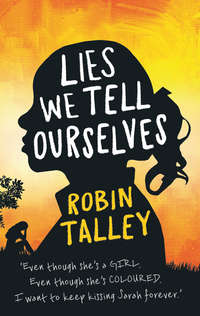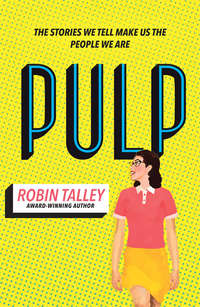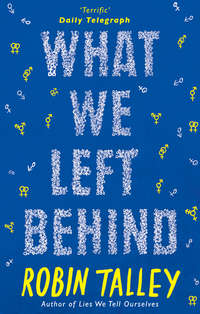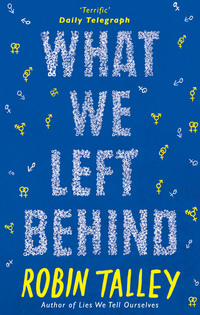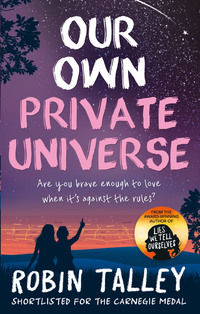
Полная версия
The Love Curse of Melody McIntyre
But I don’t mind the idea of auditions taking us late into the night. In fact, whatever the opposite of minding is, that’s me right now.
I’m the only student who gets to be in the room for auditions. Ms. Marcus has already reminded me about twenty times that I have to keep everything I see and hear totally confidential, and that I have to be impartial, even when the auditioners are my friends. I promised I’d show her exactly how professional I can be.
“What’s the gender breakdown, Mel?” Ms. Qiao asks. “Just roughly.”
“I’d say about three girls for every boy.”
Ms. Qiao and Ms. Marcus exchange a look, and I know what they’re thinking: it’s going to be really hard to find enough guys with decent singing voices to put on Les Mis.
This happens with every show we do, to some degree. There are always more talented girls than guys, and most shows have more male characters than female characters, because theater’s always been pretty sexist. To get around that, our teachers usually wind up casting a lot of girls in male roles, but that’s hard to do with Les Mis. It would be almost impossible for a girl to sing most of the principal male roles, except maybe Gavroche. The big solos are written for specific voice types.
The main characters are these two guys, Valjean and Javert. Javert is a police officer, and he’s chasing Valjean because Valjean stole a loaf of bread. But it turns out Valjean’s a good guy, and he starts helping out this poor woman named Fantine and her daughter. Then in the second half of the show there’s this mini revolution, because it’s France, and we meet a bunch of new characters like Marius and Éponine, and there are dramatic battles, so we’ll get to build an awesome barricade set.
Mostly, though, people like Les Mis because of the singing. There’s no dialogue in the whole show, just music, and the songs—the solos, obviously, but the big group numbers, too—are gorgeous. Which means you have to cast people who can sing beautifully all night long, or the whole show will fall apart. Valjean especially has to be excellent, since he has, like, eight big solos. But if a girl tried to sing them, she’d hurt her voice for sure.
The women’s parts are a lot smaller. Fantine and Éponine are the only ones who really have a lot to do, and both of them die after just a few songs. The other big female character, Cosette, is kind of boring, and her part can only be sung by a soprano anyway.
As much as I love Les Mis, I know it’s going to be hard to cast. But, well—that’s why I’m not an actor. It’s ridiculous that you’re limited in which characters you can play based on the way your throat is shaped. As a crew member, I can learn any skill I want to, and if I work hard enough, I can do it well.
“Better give them a five-minute warning.” Ms. Marcus sips her tea. I set the timer on my phone and stride out into the hall, my binder tucked under my arm.
“Five minutes to start, everybody!” I yell.
Dozens of nervous faces turn my way. Almost every actor in the school is here, and a lot of the choir people, too. The only ones missing are the actors like Liam, who know they can’t sing and don’t want to embarrass themselves trying.
I don’t let myself make eye contact with any of them, even though I know almost everyone here. Everyone who does shows at our school knows each other, or knows of each other, at least a little bit. But today, it’s my job to be impartial.
Which isn’t easy when I spot Dom by the bathroom door. His face is so green I’m worried he’s about to puke. I want to go tell him that he doesn’t need to be so nervous—that it’s going to be all right. Instead, I carefully lift my gaze to an empty spot on the wall over his head.
When he told our friends he was auditioning, they gave him crap about it for weeks, but none of them seemed as shocked at the news as I was. Jasmin even offered to help him practice. I asked her later if she felt betrayed, but she laughed and said she didn’t see it that way—she saw it as getting a loyal spy who could tell us what the cast really talked about when we weren’t around.
“And anyway, he’ll come back to our side,” she’d added while we waited in line for our cafeteria sweet potato fries. “Once he sees how much actors suck.”
“Try to relax, everyone.” The door at the end of the hall opens and Will steps through. “It’s the school play, not the guillotine.”
A few people laugh, including me, but everyone’s hanging on his every word. Will has that vibe about him—he’s very obviously an authority figure, but he’s the kind of authority figure who everyone likes because he tells non-awkward jokes and has a gold-tipped frohawk. He’s one of the only openly gay teachers at school, too.
“I’ll be spending the rest of the afternoon hiding in the scene shop, but Ms. McIntyre, is there time for me to make a quick announcement first?” he asks. I nod, glad to be consulted. “Great. For those who don’t know me, I teach the stagecraft classes, and I’m also the theater’s technical director. And welcome, everyone, to auditions for our spring musical, Les Misérables.”
Before he’s even finished saying the title, Malik’s already stomping his feet. Some of the other actors break out into whoops and cheers, too. I clap harder than any of them, then stop myself—is clapping unprofessional?
“This show will be expensive to put on.” Will rubs his hands together, his eyes gleaming, and I already know what he’s going to say next. “So, folks, that means it’s bake sale time.”
A few people groan, but most of us laugh. Will is notorious for his bake-sale obsession.
“Everyone on the cast and crew will need to take part.” Will glances at me, and I nod and pat my binder. “Ms. McIntyre has the sign-up sheets. Does everyone know Ms. McIntyre, by the way?”
I blush and shake my head. Should have thought to introduce myself.
“Well, this is Melody McIntyre.” Will strolls over to stand beside me. “She’s the stage manager, which means everyone on the tech crew answers to her. The actors do too, especially if Ms. Marcus and Ms. Qiao aren’t around. Mel’s the person to talk to if you’re interested in joining the crew, and she’s also the person you should go to with any questions. Unless you need an excellent recipe for cherry soufflé, in which case, I’m your guy.”
There’s more laughter, and I can’t stop myself from grinning. But just then my timer rings, so I duck back into the choir room.
“Are you ready?”
“Ready, Melody.” Ms. Qiao slides gracefully onto the piano bench. “Send in the first sign-up.”
I nod and step back into the hall. Will’s already gone. I overheard him telling my dads you couldn’t pay him enough to sit through Les Mis auditions, but that’s probably because he’s so old he’s forgotten how to have fun.
“Hi, everybody.” I raise my voice so they can all hear me. “We’re going in the order you signed up, so look at the sheet and see where your name falls. Make sure you’re in the hall when I call your name, because if you’re not here, you forfeit your audition. Any questions?”
No one moves. No one even blinks. A freshman sitting across the hall looks like she’s about to cry.
“And relax.” I try to sound reassuring. I’m going to be working with this cast for the next three months, and it’ll be a lot easier if they like me. “The teachers are really nice, and all you have to do is sing sixteen bars. Then you can chill out and eat Cocoa Puffs until the cast list goes up on Wednesday. Wicked easy, right?”
A few people laugh. The anxious freshman across from me cracks a tiny smile.
“Give me your audition form as you’re going in. If you have sheet music, you can take it to Ms. Qiao at the piano when you get inside. Okay, last chance to ask questions.”
No one says anything, and I realize I’m torturing them by talking so much. Crap. I flip over the sign-up sheet. “First up is Imani Miller.”
A freshman—not the one across the hall who looked like she was about to cry, but another girl who looks like she’s also about to cry—steps forward, her legs wobbling. I smile, take her form, and lower my voice.
“Good idea,” I whisper. “Going first, you’ll get it out of the way while everyone else is still stressing.”
She smiles faintly and nods.
I open the door and lead her into the room. The teachers both smile warmly, and Ms. Marcus gives Imani a little wave.
“Break a leg,” I whisper. Then I raise my voice, reading off her audition form. “This is Imani Miller, freshman, and she’ll be singing—‘On My Own.’”
The teachers’ smiles stay as firm as ever as Imani wobbles over to the piano. She hands Ms. Qiao her sheet music, and the two of them talk quietly. Imani manages to compose her face as Ms. Qiao launches into the opening notes.
It’s actually a really good audition. It’s obvious Imani’s been practicing. The teachers clap when she’s done, and Imani smiles, as though she’s finally allowing herself to breathe.
The auditions go faster than I expected after that. Sixteen bars of a song isn’t very long, and most of the actors have come prepared. Three girls in the first half hour sing “On My Own,” but they’re all pretty good, and there are plenty of other songs in the mix, too. Even the girls who aren’t great singers are clearly trying hard, and that counts for a lot.
The guys are more all over the map. Some of them don’t even really sing, they just talk along to the music, which you absolutely can’t get away with doing in Les Mis. Still, a few of them are solid. Julio Ramirez, who was Tybalt in R&J, sings “Gaston” from Beauty and the Beast, and he manages to both sing really well and be darkly funny at the same time. And David Patel, about whom I know nothing except that he’s a good performer and he used to date Odile Rose, sings a song from The Scarlet Pimpernel. He has a strong stage presence from the moment he walks in the door, and his voice is incredibly deep and rich compared to every other guy we’ve heard.
Dom’s up next, and I work hard to keep my face neutral as I take his form. I wouldn’t let him tell me which song he was auditioning with, since I was afraid I’d accidentally give him some sort of hint about what the teachers were looking for. Though, come to think of it, I don’t actually know what the teachers are looking for.
“This is Dominic Connor, junior.” I keep my voice totally flat as I read. “He’s singing ‘Hotel California.’”
“Nice to see you stepping onto the other side of the fence, Dom.” Ms. Marcus smiles. Dom tries to smile back, but his face has turned from green to white.
Once Ms. Qiao starts playing, though, he launches into the song with no hesitation. I expected him to sound fine, but actually, he’s good. Really good. He’s swaying a little because he’s nervous, and his twisty facial expressions are a tiny bit much for the song, but he still sounds better than I’ve ever heard him. His voice is clear and full for the whole sixteen bars. He must’ve been practicing this song for weeks.
How did I not know he’d been working so hard on this? What else has been going on when I wasn’t paying attention?
As I lead him out of the room, I catch the teachers trading a look. Ms. Marcus jots something down on Dom’s audition form, then crosses it out and writes something else.
Could she be thinking about casting him as one of the principals? Dom isn’t an obvious choice for Les Mis—he sang a rock song to audition for a musical from the 1980s, for one thing, plus he’s kind of skinny and quirky for a powerful role like Valjean or Javert—but he’s obviously willing to put in the effort, and we haven’t seen that many other guys yet with strong voices.
The next few auditions pass quickly. Christina’s pretty good, but she’s better at acting than she is at singing. Her friend Leah goes next and she’s a lot better. Malik’s turn comes after that and he’s good, really good, but he’s still not as good as Sebastian Santos was when he used to star in all our musicals. Too bad he’s off at Northwestern now, or we could bring him in as a ringer.
“Let’s take a quick break,” Ms. Marcus says after Andrew Hernandez finishes singing “The Music of the Night.” “Three minutes?”
“Five minutes,” Ms. Qiao says, standing up and flexing her fingers.
When I go out into the hall, Dom is already gone. The people still waiting sit up straight when they see me, but I wave apologetically. “At ease. The teachers are taking a break.”
There’s a chorus of groans, but all I can do is shrug and smile again as I turn toward the sign-up sheet. A tall girl is reaching for it with a pen in her hand, despite the giant sign that says ALL INTERESTED STUDENTS MUST SIGN UP BY NOON and the line I drew after the cutoff with NO MORE SIGN-UPS written under it.
“Hey.” I tap her shoulder. “Auditions are closed.”
“Oh, I’m terribly sorry.” The girl steps back. I recognize her semi-British accent before I recognize her face, but when I do, I nearly trip over my own feet trying to put more space between us.
She looks different than the last time I saw her. But then, she always does, since her hair’s usually got fresh dye for some new role or another. When she first came back from Iceland in December, it was standard Hollywood-issue blond, but when I spotted her walking through the cafeteria by herself a week ago, she’d gone auburn.
Today her hair’s dark brown, with loose curls and messy tangles framing her face. Her white skin is lightly tanned even in February, her eyeliner’s perfectly straight, her belted pink shirtdress probably cost more than Pops’s car, and somehow, she’s prettier than I remember.
She glances at the pen in her hand and lowers it, giving me a sheepish smile. “I can see how this looks. I’d already put my name down, but I was curious about how many others had signed up after me. I like to audition toward the beginning if I can, because . . . oh, I suppose it doesn’t matter, does it? I’m sorry to take up your time, I’m sure you’re very busy.”
I shake my head. I should be the one apologizing. Her name’s been there all afternoon. Odile Rose, written in neat, curving blue ink, right under Nicholas Underwood.
I wonder what the brunette look is for. A Vogue spread? Some kind of celebrity Instagram challenge? Whatever it is, it’s working for her.
I smile back at her. Then I remember that she’s Odile Rose and we don’t need her in this show in the first place, and I let my face go blank.
“Sorry, I saw that you signed up already.” I shrug, doing my best to talk to her the same way I’d talk to any other actor. “My mistake.”
“Oh, no, you’re just doing your job.” She meets my eyes, and, ugh, now I’m blushing. Blushing in front of actors almost definitely qualifies as unprofessional behavior. “Good SMs are always sticklers about the rules. Congratulations on the position, by the way. I knew Ms. Marcus would pick you after you did those incredible sets last year for Joseph.”
My blush deepens. Actors don’t usually notice things like who designed the sets, much less remember them a year later.
But even with Odile’s rotating palette of hair colors, I’d always remember her.
I was still in eighth grade when she did her first musical at BHS, but my dads and I had been coming to see the shows here for years. I was doing middle school shows back then, and I remember how huge the high school stage looked. It’s funny to think about now that I’ve moved scenery across it hundreds of times.
Odile was only a freshman then, but she’d been in Annie on Broadway the year before. Still, I didn’t really get why everyone was so excited about the phenomenon that was Odile until that night when I watched her play Elle Woods in Legally Blonde.
It was the first time—and the last—that a freshman had gotten the lead in a BHS musical, and Odile carried that whole show on her slim shoulders. She’d bleached her hair platinum, and she sang song after song after song—it’s one of those shows where the main character has to sing pretty much all night—and nailed every one. Her big solo at the end of the first act got a standing ovation, and during the curtain call the audience literally screamed when she came out to bow.
What stuck with me about Odile that night, though, wasn’t the way she held the high notes (though wow, did she ever hold those high notes). It was how happy she looked at the end.
During the show, she’d been acting—her character is supposed to look sad or overwhelmed or falsely confident for most of it—but in the curtain call, we got to see the real Odile for the first time. And the real Odile looked absolutely radiant. There wasn’t a drop of sweat on her, even though she’d spent the past two and a half hours dancing under the blazing lights. She was grinning so wide she looked ready to burst into a blaze of light herself.
She just seemed so . . . delighted. As though getting to do what she loved onstage was the biggest thrill imaginable. For a split second, I almost understood the appeal of acting.
Then the actor who’d played the UPS guy took off his shirt and waved it around over his head, and the audience started screaming all over again, and Odile stepped back into the line with the rest of the cast, the bliss on her face already fading into a standard pasted-on curtain-call smile.
And I remembered why acting was the worst job in theater.
“Is it true that you designed the whole set by yourself?” she asks me now. “That’s what Wes told me.”
I scratch the back of my neck. “Er, yeah.”
“It was really beautiful.”
“Oh, um. Thank you.”
“I loved those huge paintings upstage, with the hieroglyphics.” She sounds so earnest I’m not sure how to respond. “I used to sit in the house when I was waiting to go on and just stare at them. The patterns were mesmerizing.”
My mouth drops open. Mesmerizing was exactly what I’d been going for. The panels I’d painted had hung onstage through the whole show, and I’d imagined audience members studying every angle of the patterns during scene changes, but I’d never pictured the actors looking so closely. Especially her.
“Um, well. Thanks. I had a ton of help executing it. I was inspired by a set for Aida from this one theater in Austria, actually, so, um, it wasn’t totally . . .”
I order myself to stop telling Odile all these details she didn’t ask for and probably couldn’t care less about.
Besides, why do I keep stumbling over my own voice? I’m clear and succinct when I talk. When you’re doing a show, there’s no time for unnecessary syllables.
“I love it when there are actual paintings onstage.” Odile doesn’t seem to have noticed how flummoxed I am, but a few of the others have turned around to watch us. I scratch my neck again. I can’t believe she’s still standing here, talking to me about set design. “I did a show once with this amazing painted backdrop of a cityscape, but after previews they switched it out for a projection. I don’t know why—maybe a critic complained? The projection was nice, but there’s something about paint. It’s just part of theater to me. Like the smell of sawdust, you know?”
I nod—I agree with her, vehemently—and try to place which show she’s talking about. We’ve never done a show with a cityscape behind it. Maybe . . .
Ohhh. Wait.
There’s a cityscape in the Broadway set of Annie.
“Projections can be really hard to work with,” I say, because I want her to think I know as much about theater as she does, even though I have a feeling that’s not true. “I saw a show once where this giant blinking message suddenly popped up on the scrim that said ‘Error—Restart.’ The whole audience started laughing right in the middle of this serious scene about cancer.”
Odile winces sympathetically, and she looks like she’s about to say something else when a voice comes in over her shoulder.
“Mel?” Alejandra’s gripping a piece of sheet music in her hand. Odile turns around and brushes her hair behind her ear, a move that looks precisely calculated to show off the pale pink manicure that perfectly matches her dress. Or maybe it’s not calculated at all, and she just naturally exudes glamour.
I need to stop wondering about stuff like that. I despise uncertainty of any kind. “What’s up, Alejandra?”
“Could I ask you a question? About my music for the audition? How do I know exactly when to start singing after the piano—”
Only then does Alejandra notice who I’m talking to. The new hair color must’ve thrown her off, too, but now she steps back, her eyes widening, as though Odile’s a tiger who just escaped her enclosure at the zoo. “Oh! I didn’t mean to interrupt.”
“Odile! There you are!” Christina’s voice comes out of nowhere. I turn around to see her charging toward us, Leah right on her heels. “We saw that you were auditioning later and we hoped we’d catch you. We’re so glad you’re going to be in town to do the musical with us! Aren’t we, Leah?”
“We are!” Leah chirps, smiling her most fawning smile.
Oh, God. I so don’t have time for sycophantic actors.
But Odile is beaming at the girls, showing precisely the right number of teeth. It’s clear she’s forgotten all about me, so I roll my eyes and turn back to Alejandra, trying to focus on the sheet music she’s holding out.
She’s singing “In My Own Little Corner” from Cinderella. It’s a good song choice. Alejandra was excellent in R&J, and rumor has it she’s been singing brilliantly with her church choir for years, but she’s always been too nervous to sing a solo so she’s never auditioned for a musical before.
“After I introduce you, just take your music up to Ms. Qiao and she’ll help you figure it out,” I tell her. “Don’t worry, she makes it really easy. She’ll probably play one note, and then she’ll let you start and follow your lead.”
“Melody?” Ms. Marcus sticks her head out the door.
Crap! I forgot to set my timer!
“Sorry! Oh my gosh, I’m so sorry!” I jog to the door.
Ms. Marcus laughs. “Relax, you’re not late. But we’re ready, so let’s get this show back on the road.”
I nod and turn to the sign-up sheet, all business. “Henry Qualls, you’re up.”
Henry, a sophomore, sings a song from Hamilton—not very well—and then it’s Alejandra’s turn. The teachers both beam at her while she smiles nervously. And just as I suspected, she sounds fantastic.
I call more names after that, and Ms. Marcus and Ms. Qiao keep smiling as we sit through the same songs over and over again. It’s starting to feel like a never-ending parade of “On My Own,” Disney, and Phantom. Plus, two different girls who try, and fail, to sing “Defying Gravity,” which . . . no. No one should ever try to sing that song without about fifteen years of vocal lessons behind them.
Then there’s a long string of auditions where no one seems to be trying at all. People who sway on their feet so much it’s impossible to focus on their voices, or who sing so quietly we can barely hear them over the piano, or who forget the words (how can anyone forget the words to just sixteen bars of music? Seriously, how?). I’m starting to see why Ms. Qiao and Ms. Marcus weren’t as excited going into auditions as I was.
After the afternoon’s third rendition of “Let It Go,” I’m yawning in my seat when Ms. Marcus taps my elbow with her pencil. I jump up to escort the latest girl out and look down at the sign-up sheet.
“Nicholas Underwood,” I call.
No one answers. A few people start giggling. I try again. “Nicholas Underwood?”
A white guy I vaguely recognize—he’s a fellow junior, and I think we once had English together—lifts his head and slowly climbs to his feet, his phone in his hand. He’s really tall, with a broad chest, and his arms are all muscly. Maybe he plays a fall sport.
He tries to walk past me without looking up from his phone. When I hold out my hand, he finally glances up. “You need something?”


